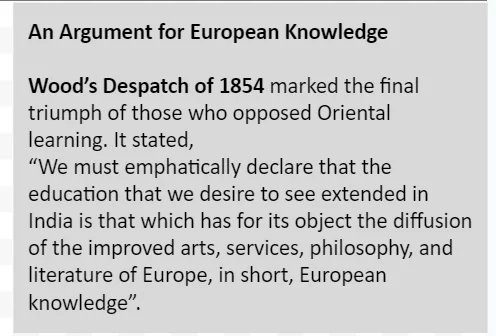The British came to India not only to fulfill their territorial conquest and control over revenue but they also felt that they had a cultural mission to “civilize the natives”, change their customs and values. For this they took special interest in “education of Indians”. This had several implications on the lives of Indians. And our education system, even today, is heavily influenced by the systems introduced by the British.
Education Under the British Rule
Evolution of Education: Many ideas of education and many education systems that we take for granted today have evolved in the last two hundred years.
Orientalist Thought




Critique of Orientalists: The people from this school of thought criticized the Orientalists.

| Must Read | |
| Current Affairs | Editorial Analysis |
| Upsc Notes | Upsc Blogs |
| NCERT Notes | Free Main Answer Writing |
British rule in India introduced a new era of education. The debate between Orientalists and Anglicists shaped a system that valued Western knowledge delivered in English. This foundation, though reformed, continues to influence Indian education today.
| Related Articles | |
| Economic Impact Of British Rule In India | British Paramountcy in India: Annexations, Administration and Military Evolution |
| SUPREME COURT | Indian Education System |
<div class="new-fform">
</div>